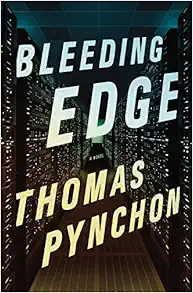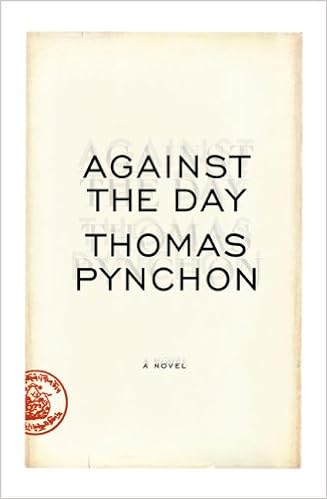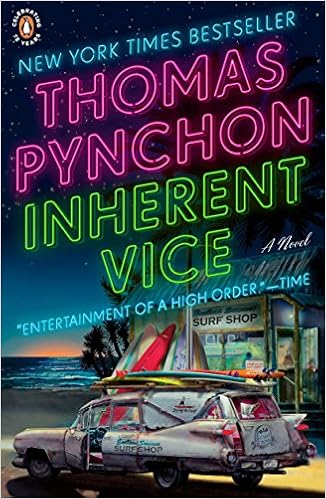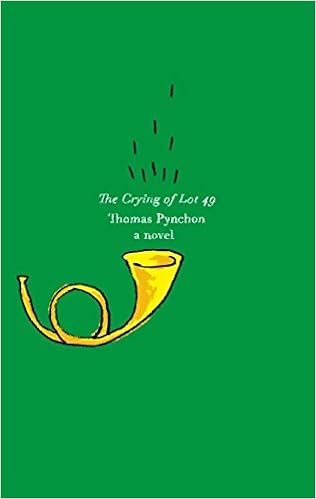
Description
From Publishers Weekly Reviewed by David Kipen. Published 50 years ago by long-gone J.B. Lippincott & Co., Thomas Pynchon's V. wasn't just the best first novel ever, it was a blueprint for his entire career. Much as that book yoyo-ed between an international femme fatale and a feckless contemporary klutz, the Pynchon shelf has alternated between globe-trotting, century-spanning bricks like Gravity's Rainbow (1973), and impish, only slightly historical, California-set bagatelles like Inherent Vice (2009). Now comes Bleeding Edge, a lovably scruffy comedy of remarriage, half-hidden behind the lopsided Groucho mask of Pynchon's second straight private-eye story. Like Ornette Coleman's riff on The Rite of Spring, it starts out strong, misplaces the melody amid some delightfully surreal noodling, and finally swans away in sweet, lingering diminuendo. Almost all Pynchon's books are historical novels, with this one no exception. Where Vineland slyly set a story of Orwellian government surveillance in 1984, Bleeding Edge situates a fable of increasingly sentient computers in, naturally, 2001. Of course, the year 2001 means something besides HAL and Dave now, and Pynchon spirits us through "that terrible morning" in September--and its "infantilizing" aftermath--with unhysterical grace. Our heroine throughout is Maxine Tarnow, a defrocked fraud investigator and daftly doting Manhattan mom, still stuck in that early, "my husband...ex-husband" stage of an unwanted divorce. Maxi soon becomes embroiled in the mysterious case of one Lester Traipse, a superannuated Silicon Alley veteran who, along with the dotcom bubble, has just gotten popped. The plot's dizzying profusion of murder suspects plays like something out of early Raymond Chandler, under whose bright star Bleeding Edge unmistakably unreels. Shoals of red herrings keep swimming by, many of them never seen again. Still, reading Pynchon for plot is like reading Austen for sex. Each page has a little more of it than the one before, but you never quite get to the clincher. Luckily, Pynchon and Austen have ample recourse to the oldest, hardest-to-invoke rule in the book --when in doubt, be a genius. It's cheating, but it works. No one, but no one, rivals Pynchon's range of language, his elasticity of syntax, his signature mix of dirty jokes, dread and shining decency. It's a peculiarity of musical notation that major works are, more often than not, set in a minor key, and vice versa. Bleeding Edge is mellow, plummy, minor-key Pynchon, his second such in a row since Against the Day (2006)--that still-smoking asteroid, whose otherworldly inner music readers are just beginning to tap back at. But in its world-historical savvy, its supple feel for the joys and stings of love--both married and parental--this new book is anything but minor. On the contrary, Bleeding Edge is a chamber symphony in P major, so generous of invention it sometimes sprawls, yet so sharp it ultimately pierces. All this, plus a stripjoint called Joie de Beavre and a West Indian proctologist named Pokemon. Who else does that?David Kipen is the former director of reading initiatives at the National Endowment for the Arts and is the founder of Libros Schmibros, a nonprofit lending library and used bookstore in Los Angeles. From Booklist *Starred Review* Pynchon’s debut novel, V., appeared 50 years ago, and ever since he’s been tracking dubious covert actions and the arc and consequences of technology in novels of labyrinthine complexity, impish wit, and open-armed compassion. Of late, his inquiry has taken the form of rambunctious and penetrating crime novels. Inherent Vice (2009), currently being adapted for film, is set in 1960s Los Angeles and features a pothead PI and the launch of the digital revolution. In his latest, a hilarious, shrewd, and disquieting metaphysical mystery, Pynchon expresses love for New York City and leeriness of the seemingly boundless reach of the Internet. In spring 2001, the dot-com bubble has burst and 9/11 looms. Maxine Tarnow, a fraud investigator gone rogue, is unflappable, wise-cracking, Beretta-toting, and Jewish. Devoted to her young sons, she is embroiled in an amorphous case involving a sinister techie billionaire, diverted funds, Islamic terrorists, hip-hop-spouting Russian gangsters, a black-ops agent, a cosmic bike messenger, and a “Deep Web” virtual reality. Fearless, caustic, lightning-witted Maxine (sister to characters created by Sara Paretsky and Cynthia Ozick) instigates some of the funniest banter ever scripted. But amid the sharp hilarity of this exuberantly maze-like, pop-culture-peppered, deeply informed tale, Pynchon incisively and cuttingly broaches unanswered questions surrounding the tragedy of 9/11 and elucidates just how profoundly life has changed in its wake.HIGH-DEMAND BACKSTORY: Pynchon is a magnet for media attention and reader fervency, and this New York mystery will exert a powerful pull. --Donna Seaman From Bookforum Even as its plot grows ever more complex, Bleeding Edge is reliably entertaining as a sort of cracked Zagat’s, with entries ghostwritten by Ben Katchor. —Ed Park ***A New York Times Notable Book of 2013*** “ Brilliantly written… a joy to read… Full of verbal sass and pizzazz, as well as conspiracies within conspiracies, Bleeding Edge is totally gonzo, totally wonderful. It really is good to have Thomas Pynchon around, doing what he does best. ” — Michael Dirda, The Washington Post “A precious freak of a novel, glinting rich and strange, like a black pearl from an oyster unfathomable by any other diver into our eternal souls. If not here at the end of history, when? If not Pynchon, who? Reading Bleeding Edge , tearing up at the beauty of its sadness or the punches of its hilarity, you may realize it as the 9/11 novel you never knew you needed… a necessary novel and one that literary history has been waiting for , ever since it went to bed early on innocent Sept. 10 with a copy of The Corrections and stayed up well past midnight reading Franzen into the wee hours of his novel’s publication day.” —Slate.com “Are you ready for Thomas (Screaming Comes Across the Sky) Pynchon on the subject of September 11, 2001?... Exemplary… dazzling and ludicrous… Our reward for surrendering expectations that a novel should gather in clarity, rather than disperse into molecules, isn’t anomie but delight. Pynchon himself’s a good companion, full of real affection for his people and places, even as he lampoons them for suffering the postmodern condition of being only partly real.” — Jonathan Lethem, New York Times Book Review “ Surely now Pynchon must be in line for the Nobel Prize?... Thomas Pynchon, America’s greatest novelist, has written the greatest novel about the most significant events in his country’s 21st century history. It is unequivocally a masterpiece.” — The Scotsman (UK) “ The book’s real accomplishment is to claim the last decade as Pynchon territory, a continuation of the same tensions — between freedom and captivity, momentum and entropy, meaning and chaos — through which he has framed the last half-century… As usual, Pynchon doesn’t provide answers but teases us with the hint of closure, leaving us ultimately unsure whether the signals add up to a master plot or merely a series of sinister and unfortunate events. The overall effect is one of amused frustration, of dying to find that one extra piece of information that will help make sense of this overwhelming and vaguely threatening world. It feels a lot like life.” — Wired magazine “ The New York of late 2001 was a Pynchon novel waiting to happen , in which the failures of ‘late capitalist’ speculation, in the form of the recently deflated tech bubble, meet 9/11 to form the 21st century’s Year Zero.” — New York Observer “ Pynchon's prose is irresistible. It's playful and bustling — cheesy puns rub elbows with Big Ideas.xa0 A-” — Entertainment Weekly “ Brilliant and wonderful… Bleeding Edge chronicles the birth of the now — our terrorism-obsessed, NSA-everywhere, smartphone Panopticon zeitgeist — in the crash of the towers. It connects the dots, the packets, the pixels. We are all part of this story. We are all characters in Pynchon’s mad world. Bleeding Edge is a novel about geeks, the Internet, New York and 9/11. It is funny, sad, paranoid and lyrical. It was difficult to put down. I want to read it again.” —Salon.com “ Bleeding Edge takes the messy, funny, and sad all-at-once world we live in and reflects it back to us in a way that I can only call consoling —somebody else out there gets it. No matter how crazy things became in this book, I felt safe as long as I was inside its pages. So of course as soon as I finished it, I started over again .” —Malcolm Jones, Daily Beast /Newsweek “ Bleeding Edge may be the book Thomas Pynchon was born to write .” — New York Daily News, “Page Views” “ The ingeniously whimsical, accessible story of a New York City fraud investigator who becomes entangled with some very sketchy characters as she tries to get to the bottom of a case involving a tech billionaire .” —O: The Oprah Magazine “ Showstopping …The future that [Pynchon] so precociously, disturbingly foresaw long ago now surges around us. With Bleeding Edge, he shows that he has mastered the move from the shock of the new to the shock of the now, while cushioning the blow.” —Leisl Schillinger, Barnes & Noble “ Bleeding Edge is vintage Pynchon, a louche yarn of rollicking doomism. Pynchon is the master of technology-as-metaphor . In previous books—particularly “V.” and “Gravity’s Rainbow”—there is a persistent, shadowy suggestion of an unseen system, mechanisms that underlie the perceived reality of events. And these mechanisms are often manifest in the vagaries of things like rocket science and radio broadcasting tools. In those old books, however, the obscure schema was cast as an almost magical or mystical force, but as Bleeding Edge appears, we have the real thing .”— Seattle Times “ Fabulously entertaining … Bleeding Edge is stuffed with gorgeous passages that sing their longing for all we’ve lost, in trashing the land and ourselves. But such writing is also a stirring call to arms, making clear that the history we’ll make depends on what and how we remember. As Pynchon has been reminding us for 50 years, there’s always more than one way to tell that story.” — Milwaukee Journal Sentinel “Pynchon’s Bleeding Edge is a masterpiece of post- and pre-9/11xa0paranoia.”— Las Vegas Weekly "A hilarious, shrewd, and disquieting metaphysical mystery." — Booklist (STARRED) "No one, but no one, rivals Pynchon’s range of language, his elasticity of syntax, his signature mix of dirty jokes, dread and shining decency… Bleeding Edge is a chamber symphony in P major, so generous of invention it sometimes sprawls, yet so sharp it ultimately pierces.” — Publishers Weekly "A much-anticipated return, and it’s trademark stuff: a blend of existential angst, goofy humor and broad-sweeping bad vibes." — Kirkus Reviews (STARRED) "Truly your most important reading for the fall... darkly hilarious." — Library Journal Thomas Pynchon is the author of V. , The Crying of Lot 49 , Gravity’s Rainbow , Slow Learner , Vineland, Mason & Dixon , Against the Day , Inherent Vice , and Bleeding Edge . He received the National Book Award for Gravity’s Rainbow in 1974. Excerpt. © Reprinted by permission. All rights reserved. It’s the first day of spring 2001, and Maxine Tarnow, though some still have her in their system as Loeffler, is walking her boys to school. Yes maybe they’re past the age where they need an escort, maybe Maxine doesn’t want to let go just yet, it’s only a couple blocks, it’s on her way to work, she enjoys it, so? This morning, all up and down the streets, what looks like every Callery Pear tree on the Upper West Side has popped overnight into clusters of white pear blossoms. As Maxine watches, sunlight finds its way past rooflines and water tanks to the end of the block and into one particular tree, which all at once is filled with light. “Mom?” Ziggy in the usual hurry. “Yo.” “Guys, check it out, that tree?” Otis takes a minute to look. “Awesome, Mom.” “Doesn’t suck,” Zig agrees. The boys keep going, Maxine regards the tree half a minute more before catching up. At the corner, by reflex, she drifts into a pick so as to stay between them and any driver whose idea of sport is to come around the corner and run you over. Sunlight reflected from east-facing apartment windows has begun to show up in blurry patterns on the fronts of buildings across the street. Two-part buses, new on the routes, creep the crosstown blocks like giant insects. Steel shutters are being rolled up, early trucks are double-parking, guys are out with hoses cleaning off their piece of sidewalk. Unsheltered people sleep in doorways, scavengers with huge plastic sacks full of empty beer and soda cans head for the markets to cash them in, work crews wait in front of buildings for the super to show up. Runners are bouncing up and down at the curb waiting for lights to change. Cops are in coffee shops dealing with bagel deficiencies. Kids, parents, and nannies wheeled and afoot are heading in all different directions for schools in the neighborhood. Half the kids seem to be on new Razor scooters, so to the list of things to keep alert for add ambush by rolling aluminum. Read more
Features & Highlights
- "Brilliantly written...a joy to read...
- Bleeding Edge
- is totally gonzo, totally wonderful. It really is good to have Thomas Pynchon around, doing what he does best." - Michael Dirda,
- The Washington Post
- "Exemplary...dazzling and ludicrous." - Jonathan Lethem,
- The New York Times Book Review
- It is 2001 in New York City, in the lull between the collapse of the dot-com boom and the terrible events of September 11th. Maxine Tarnow runs a fine little fraud investigation business on the Upper West Side. All is ticking over nice and normal, until she starts looking into the finances of a computer-security firm and its billionaire geek CEO. She soon finds herself mixed up with a drug runner in an art deco motorboat, a professional nose obsessed with Hitler’s aftershave, a neoliberal enforcer with footwear issues, and an array of bloggers, hackers, code monkeys, and entrepreneurs, some of whom begin to show up mysteriously dead. Foul play, of course.Will perpetrators be revealed, forget about brought to justice? Will Maxine have to take the handgun out of her purse? Will Jerry Seinfeld make an unscheduled guest appearance? Will accounts secular and karmic be brought into balance?Hey. Who wants to know?




